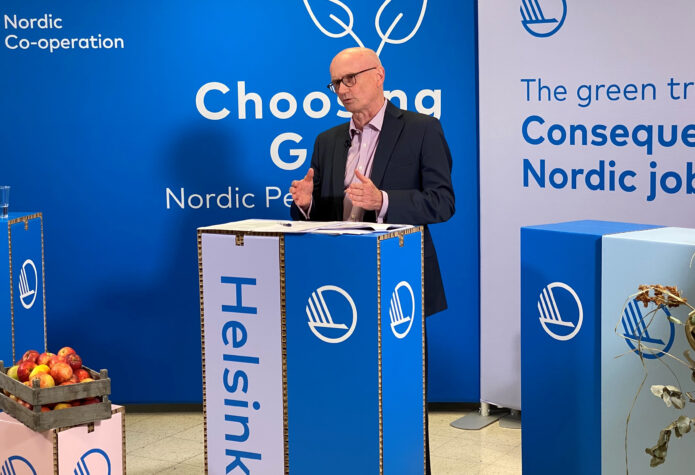Green transition already underway

On 17 November, Henrik Normann, President & CEO of Nordic Investment Bank, participated in the debate “Surviving the pandemic: Which sectors will thrive and who will suffer? The key messages were that governments should make better use of taxes, incentives and regulations, and that the green transition is already in process.
The Nordic pre-COP26 digital event is a Nordic “warm up event” for the United Nations Climate Change Conference COP26. The key points and main take-away from Tuesday’s events will be part of the Nordic Council of Ministers (NCM’s) activities and communication around the COP26 NCM plans to arrange a Nordic Pavilion in Glasgow, November 2021.
“In the short term, I can agree that in the current corona crisis jobs may come first and the green transition second. However, in the long-term these two things needs to go hand-in-hand. If we do not get this right – that people feel included in the green transition – it could become unpopular, and not receiving the support it needs,” said Henrik Normann.
The comment came as Jens Hjarsbech, Senior Economist at the business thinktank AxcelFuture, said that “while the crisis is a call to action that can fuel public investments in the green transition as a way of restoring the global economy, the focus will still be on how to restore jobs and growth – the green transition will come second.”
Glimmers of hope
Idar Kreutzer, Director of Finans Norge, said, “It is of course right that given the increased risk, willingness to invest are reduced. Interest rates are record low, stock markets are surprisingly strong and so are the fixed income markets and we see investments in infrastructure. The stimulus packages seems to have an effect on the willingness of investors to invest.”
“The second observation is that the capital markets seems to have voted for green. There is an investor appetite for green investments. For example Ørsted is one of the global favourites and the top green companies are valued 25 times higher than ‘brown’ companies,” said Kreutzer.
Whips and carrots
Cecilie Tendfjord-Toftby, member of the Committee for a sustainable Nordic Region in the Nordic Council, said economic growth and green growth are the same.
“If we, as politicians, make decision and do not explain for people what we are doing, then we are going to lose support. They are going to vote for someone else in the next election. When it comes to public procurements, we as politicians have good tools. We can make use of whips and carrots,” said Cecilie Tendfjord-Toftby.
Henrik Normann said that the problem today is that there is a lack of investable projects.
“Businesses today are placing more deposit than they are taking out in loans from banks. That is a sign of a lack of investable projects.”
“My point is that governments need to make more use of the whips and carrots that are at its disposal. All the talk about taxes and how it can change behaviour, I agree with that. Let us tax carbon more, but make sure to give tax depreciations to companies that want to invest over the next two or three years so that they depreciate faster. We have to do something. The capital is there, but there are no investments taking place, as they should.”
This debate was part of a summit consisting of six debates from five locations in the Nordic Region and online. The summit was hosted by Norden i Fokus, an initiative by the NCM. You can watch the full debate here.